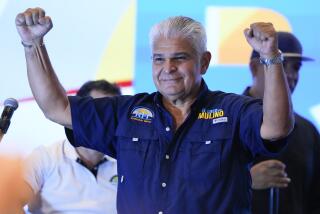Blandon Worked Behind Scenes With Opposition, U.S. : Adviser Tried to Arrange Graceful Noriega Exit
- Share via
WASHINGTON — Strongman Manuel A. Noriega is facing unprecedented political isolation in Panama after a stormy break this month with one of his oldest and closest advisers, according to Panamanian and American participants in the events.
The firing Thursday of the Panamanian consul general in New York, Jose I. Blandon, brought to light a three-month, behind-the-scenes effort by Blandon to negotiate a political settlement involving Gen. Noriega, the Panamanian opposition and the United States. In the process, Noriega, who controls the government as commander of the Panamanian Defense Forces, entertained the possibility of leaving power this year, possibly as early as April.
Noriega’s feud with Blandon opened, for the first time, a public rift in the government party over the general’s tenure.
Noriega says Washington is fomenting the opposition to him in an effort to roll back the 1979 treaties that will give control of the Panama Canal to Panama in the year 2000. He has chilled Panamanian-U.S relations almost to the freezing point. In late December, the Reagan Administration dispatched Pentagon official Richard L. Armitage to Panama to tell Noriega that U.S. policy is to encourage him to step down.
But the story of the Blandon Plan, as the former consul’s efforts are called, shows that Noriega has continued to try to parley with the Reagan Administration about his future.
Blandon did not return numerous phone calls to his New York residence.
Earlier this month, Noriega publicly branded Blandon a traitor, and last week, Blandon--fearing retaliation against his family--hastily arranged for his 21-year-old son to flee Panama.
Last week, the pro-government newspapers in Panama, which are controlled by Noriega and the Democratic Revolutionary Party, dropped all rhetoric attacking Blandon, a sign of internal party debates over the former consul and his plan.
Plan Still Alive
Despite his dismissal, “his plan is still very much alive and gathering momentum,” said a Reagan Administration official.
Opposition leaders and American officials and lawmakers said Blandon told them that Noriega asked him in mid-1987 to devise a contingency plan for a transition government that would allow Noriega to step down gracefully.
In his plan, Blandon outlined reforms that he felt were necessary to achieve a rapid transition to full civilian rule and forge a more professional, apolitical army. In practice, the current president, Eric A. Delvalle, is only a figurehead. Blandon insisted in the October document and in many conversations that the canal treaties could not be touched.
Noriega “must set the time of his own retirement,” the October document said, but it would be no later than the first week of April.
Under the plan, Noriega would agree, before departing, to order into retirement all Panamanian Defense Forces officers who have completed 25 years of service. This would eliminate all but one or two officers in Noriega’s inner circle for whom he has waived mandatory retirement rules.
In Blandon’s scenario, Noriega would be succeeded by the next highest eligible officer in the hierarchy, Col. Elias Castillo. Delvalle would retain his position as president during a yearlong interim leading to May, 1989, elections organized by an independent electoral tribunal to be chosen by agreement with the opposition.
Blandon tried to find out whether Noriega, if he sought exile outside of Panama, would still face prosecution from three investigations under way in Florida into drug and money-laundering allegations against him. But U.S. officials made no promises.
More to Read
Sign up for Essential California
The most important California stories and recommendations in your inbox every morning.
You may occasionally receive promotional content from the Los Angeles Times.









